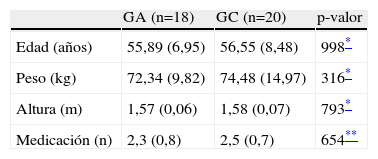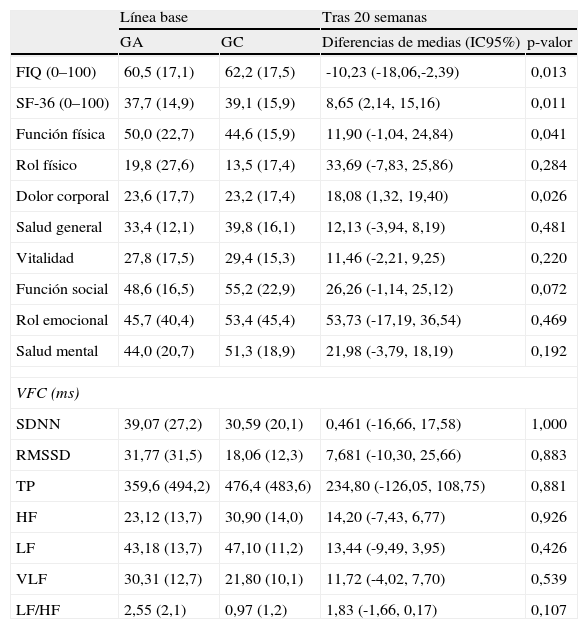La influencia del ejercicio físico a largo plazo sobre la calidad de vida (CDV) y la respuesta autónoma de las mujeres con fibromialgia (FM) no es del todo conocida, así el presente estudio pretende evaluar el efecto de 20 semanas de ejercicio aeróbico sobre variabilidad de la frecuencia cardiaca (VFC) y su efecto sobre la CDV de estos pacientes, con objeto de describir de forma más fiable esta herramienta terapéutica.
Método43 mujeres (56±7 años) diagnosticadas con FM en base a los criterios del Colegio Americano de Reumatología fueron distribuidas aleatoriamente en un grupo experimental que realizaría ejercicio aeróbico a moderada intensidad durante 20 semanas y un grupo control. Se evaluó la CDV de los pacientes (FIQ, SF-36) y su relación con la función autónoma (VFC).
ResultadosMediante esta intervención se obtuvieron mejoras significativas en FIQ (14,5%), SF-36 (24,7%) y en las dimensiones de función física y dolor corporal. Igualmente se encontraron mejoras no significativas fundamentalmente en la actividad del sistema nervioso simpático y el equilibrio simpático-vagal.
ConclusiónSi bien las diferencias reflejadas tras la intervención de ejercicio físico aeróbico a largo plazo no fueron significativas para la VFC, sí lo fueron para la mejora de la CDV de los pacientes, reflejándose una respuesta positiva sobre los principales marcadores de su función autónoma, por lo que dicha intervención podría recomendarse para la rehabilitación de las mujeres con FM.
Due to long-term influence of physical activity on quality of life (QoL) and autonomous system function on women with fibromyalgia is still unknown, the current study aims to assess the effect of 20 weeks of aerobic exercise on heart rate variability (VFC) and the effect on patients′ QoL in order to describe the feasibility of this therapeutic tool.
Method43 women with FM (56±7 years) diagnostic with FM by the American College of Rheumatology were randomly allocated to an experimental that would perform aerobic exercise at moderate intensity for 20 weeks and a control group. Patient′ quality of life was evaluated by using FIQ and SF-36 and also the autonomous nervous system was assessed via HRV test.
ResultsSignificant improvements for FIQ (14.5%), SF-36 (24.7%) and physical function and bodily pain domains were found after long-term aerobic exercise program. In addition non-significant improvements were found mainly in the activity of the sympathetic nervous system and sympatho-vagal balance.
ConclusionAlthough non-significant differences were found in the patient′ VFC, through aerobic exercise patients improved their quality of life and had a positive response on the main autonomous function markers, therefore this intervention can be recommended in the functional recovery of FM patients.
Artículo
Comprando el artículo el PDF del mismo podrá ser descargado
Precio 19,34 €
Comprar ahora










